Reminiscing
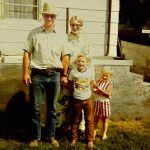 My husband, Bob’s Aunt Pearl Hein is a very ambitious person. For years, she has raised a garden, and canned tons of vegetables. She and Uncle Eddie have long been very busy people…maybe too busy sometimes. Pearl worked for many years at the IGA store in Forsyth, Montana, and pretty much became vital to the functioning of that place. That did make it hard for Pearl to entertain, and at least when we were in town, she always enjoyed having everyone come over for dinner. We didn’t get to Forsyth often, and she liked to make our visit very special. And she did make our visits special…not just because she is a great cook, but because she always made us feel welcome. Going to visit Eddie and Pearl was always a highlight of our visits to Forsyth.
My husband, Bob’s Aunt Pearl Hein is a very ambitious person. For years, she has raised a garden, and canned tons of vegetables. She and Uncle Eddie have long been very busy people…maybe too busy sometimes. Pearl worked for many years at the IGA store in Forsyth, Montana, and pretty much became vital to the functioning of that place. That did make it hard for Pearl to entertain, and at least when we were in town, she always enjoyed having everyone come over for dinner. We didn’t get to Forsyth often, and she liked to make our visit very special. And she did make our visits special…not just because she is a great cook, but because she always made us feel welcome. Going to visit Eddie and Pearl was always a highlight of our visits to Forsyth.
Pearl married Bob’s uncle Eddie on July 15, 1962, and they had two children, Larry Hein and Kimberly (Hein) Arani. They were then busily raising their family and spending time with siblings and parents. When Pearl’s parents needed help i their later years,she was right there to help them, often spending long hours at their homes. I remember many times that they were not able to take vacations because they were so busy. Now that they are both retired, they have more time to travel a little, and they have made a  couple of trips to Texas to visit their daughter, who lives there. I like that they can get away sometimes to a warmer climate, and I’m sure Kim likes it too.
couple of trips to Texas to visit their daughter, who lives there. I like that they can get away sometimes to a warmer climate, and I’m sure Kim likes it too.
Their son, Larry and his family still live in Forsyth, and for them as well as Eddie and Pearl, that will always be home. I’m not sure any of them will ever live anywhere else, and I can understand that. Forsyth is a cute little town, with a rich history. The family, from many branches, has roots there. While none of my own family were born there, Forsyth, and all of Bob’s family who are still there, will always hold a special place in my heart. And Pearl had a big part in those memories. Today is Pearl’s birthday. Happy birthday Pearl!! Have a great day!! We love you!!
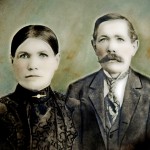 My great grandparents, Carl and Henriette (Hensel) Schumacher immigrated to the United States from Germany, in 1884 and 1882 respectively. It was an amazing time for them. The United States was a whole new world, and for those who came, the land of opportunity. By 1886, they were married and ready to start a family. My grandmother, Anna Schumacher was born in 1887, followed by siblings Albert, Mary (who died before she was 3), Mina, Fred, Bertha, and Elsa, who was born in 1902.
My great grandparents, Carl and Henriette (Hensel) Schumacher immigrated to the United States from Germany, in 1884 and 1882 respectively. It was an amazing time for them. The United States was a whole new world, and for those who came, the land of opportunity. By 1886, they were married and ready to start a family. My grandmother, Anna Schumacher was born in 1887, followed by siblings Albert, Mary (who died before she was 3), Mina, Fred, Bertha, and Elsa, who was born in 1902.
By 1914, World War I broke out, following the assassination of Franz Ferdinand. The government of the United States was understandably nervous about the German immigrants now living in in America. It didn’t matter that many of these people had been living in the united States for a long time, and some had become citizens, married, and had families. The government was still nervous, and I can understand how that could be, because we have the same problem these days with the Muslim nations. Still, when I think about the fact that these were my sweet, kind, and loving, totally Lutheran great grandparents, I find it hard to believe that anyone could be nervous about them. Apparently, I was right, because to my knowledge, they were never detained in any of the internment camps, nor were they even threatened with it.
Nevertheless, there were German nationals, and even naturalized citizens who faced possible detention during 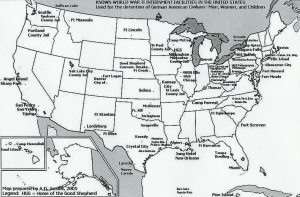 World War I and World War II. By World War II, President Franklin Delano Roosevelt declared Presidential Proclamation 2526, the legal basis for internment under the authority of the Alien and Sedition Acts. With the United States’ entry into World War I, the German nationals were automatically classified as “enemy aliens.” Two of the four main World War I-era internment camps were located in Hot Springs, North Carolina and Fort Oglethorpe, Georgia. Attorney General A. Mitchell Palmer wrote that “All aliens interned by the government are regarded as enemies, and their property is treated accordingly.”
World War I and World War II. By World War II, President Franklin Delano Roosevelt declared Presidential Proclamation 2526, the legal basis for internment under the authority of the Alien and Sedition Acts. With the United States’ entry into World War I, the German nationals were automatically classified as “enemy aliens.” Two of the four main World War I-era internment camps were located in Hot Springs, North Carolina and Fort Oglethorpe, Georgia. Attorney General A. Mitchell Palmer wrote that “All aliens interned by the government are regarded as enemies, and their property is treated accordingly.”
By the time of World War II, the United States had a large population of ethnic Germans. Among residents of the United States in 1940, more than 1.2 million persons had been born in Germany, 5 million had two native-German parents, and 6 million had one native-German parent. Many more had distant German ancestry. With that many people of German ancestry, it seems impossible that they could have detained all of them. Nevertheless, at least 11,000 ethnic Germans, overwhelmingly German nationals were detained during World War II in the United States. The government examined the cases of German nationals individually, and detained relatively few in internment camps run by the Department of Justice, as per its responsibilities under the Alien and Sedition Acts. To a much lesser extent, some ethnic German United States citizens were classified as suspect after due process and also detained. There were also a small proportion of Italian nationals 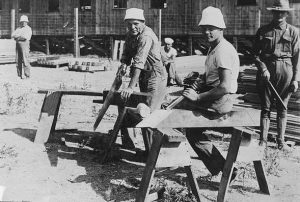 and Italian Americans who were interned in relation to their total population in the United States. The United States had allowed immigrants from both Germany and Italy to become naturalized citizens, which many had done by then. It was much less likely for those people to be detained, if they had already become citizens. In the early 21st century, Congress considered legislation to study treatment of European Americans during World War II, but it did not pass the House of Representatives. Activists and historians have identified certain injustices against these groups. I suppose that some injustices were done, but those were times of war and strong measures were needed.
and Italian Americans who were interned in relation to their total population in the United States. The United States had allowed immigrants from both Germany and Italy to become naturalized citizens, which many had done by then. It was much less likely for those people to be detained, if they had already become citizens. In the early 21st century, Congress considered legislation to study treatment of European Americans during World War II, but it did not pass the House of Representatives. Activists and historians have identified certain injustices against these groups. I suppose that some injustices were done, but those were times of war and strong measures were needed.
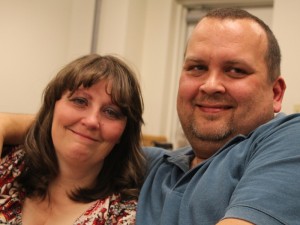
 Since becoming disabled, my son-in-law, Kevin Petersen has struggled to redefine himself. He can’t be on his feet for very long, and he can’t sit very long either. During the years since he was disabled, my daughter, Corrie Petersen, Kevin’s wife, has been pretty much single-handedly been taking care of him. Soon,it became apparent that Corrie needed a new carer. One that would be more fulfilling and one that would pay better. After much prayer, it was decided that Corrie would go back to school to become a nurse. They knew this was going to be a difficult road, that would become much harder when nursing school began. After 2 years of taking her prerequisites, Corrie started nursing school two weeks ago.
Since becoming disabled, my son-in-law, Kevin Petersen has struggled to redefine himself. He can’t be on his feet for very long, and he can’t sit very long either. During the years since he was disabled, my daughter, Corrie Petersen, Kevin’s wife, has been pretty much single-handedly been taking care of him. Soon,it became apparent that Corrie needed a new carer. One that would be more fulfilling and one that would pay better. After much prayer, it was decided that Corrie would go back to school to become a nurse. They knew this was going to be a difficult road, that would become much harder when nursing school began. After 2 years of taking her prerequisites, Corrie started nursing school two weeks ago.
Since August 20th, Kevin has reversed the roles. Now, while here are times Kevin need’s Corrie to be his caregiver, these days he is taking care of her. While Kevin must take frequent rest periods, he is cleaning the house, washing the laundry, and cooking the meals while Corrie is in school, at work, or studying. Each week of this stage of Corrie’s studies requires more work for her, and it isn’t going to get any easier until she graduates. Kevin wants to do his part. In many ways nursing school might have actually been harder for Corrie is Kevin was working, although I suppose he would be stronger too, if he wasn’t disabled. Needless to say, this process hasn’t been easy for Kevin either, and I am very proud of how he has stepped up to make this journey easier on Corrie.
When Kevin has some free time, he has been working on the Cyclone car his dad, Dean Petersen gave him a while back. He has also decided to try his hand at painting and drawing with different kinds of paint. Kevin has been dealing with tremors in his hands these days, so I’m sure painting and drawing is quite a challenge. During the times when Kevin has to lay down for a while, he has a companion who is very excited about those naps…their dog, Dottie. Dottie is a Scottish Terrier, and she totally loves Kevin. When Kevin needs to lay down, he tells Dottie they are going to take a nap. Dottie gets very excited. She is like a kid, except that she likes naps. She runs to the bedroom door and waits for Kevin to come. Then, Dottie settles herself on Corrie’s 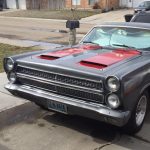
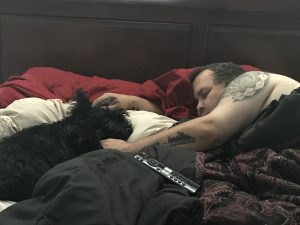 pillow. It has become Dottie’s place when Corrie isn’t there. She loves napping with Kevin. When Dottie is outside, and Kevin has his shoes on, she won’t come in the house, because she thinks it’s time to go somewhere, and she doesn’t want to be left at home. She loves Kevin so much and she wants to be with him all the time. She is content to do what Kevin can do, and rest when he needs to, so it’s good for both of them. She is a great companion. Today is Kevin’s birthday. Happy birthday Kevin!! Have a great day!! We love you!!
pillow. It has become Dottie’s place when Corrie isn’t there. She loves napping with Kevin. When Dottie is outside, and Kevin has his shoes on, she won’t come in the house, because she thinks it’s time to go somewhere, and she doesn’t want to be left at home. She loves Kevin so much and she wants to be with him all the time. She is content to do what Kevin can do, and rest when he needs to, so it’s good for both of them. She is a great companion. Today is Kevin’s birthday. Happy birthday Kevin!! Have a great day!! We love you!!
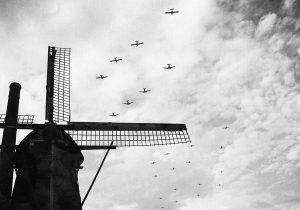 It has been 74 years since 17,740 Americans gave their lives to liberate the people of the Netherlands (often called Holland) from the Germans during World War II, and the people of Holland have never forgotten that sacrifice. For 74 years now, the people of the small village of Margraten, Netherlands have taken care of the graves of the lost at the Margraten American Cemetery. On Memorial Day, they come, every year, bringing Memorial Day bouquets for men and women they never knew, but whose 8,300 headstones the people of the Netherlands have adopted as their own. Of the 17,740 who were originally buried there, 9,440 were later moved to various paces in he United States by their families. “What would cause a nation recovering from losses and trauma of their own to adopt the sons and daughters of another nation?” asked Chotin, the only American descendant to speak on that Sunday 4 years ago. “And what would keep that commitment alive for all of these years, when the memory of that war has begun to fade? It is a unique occurrence in the history of civilization.”
It has been 74 years since 17,740 Americans gave their lives to liberate the people of the Netherlands (often called Holland) from the Germans during World War II, and the people of Holland have never forgotten that sacrifice. For 74 years now, the people of the small village of Margraten, Netherlands have taken care of the graves of the lost at the Margraten American Cemetery. On Memorial Day, they come, every year, bringing Memorial Day bouquets for men and women they never knew, but whose 8,300 headstones the people of the Netherlands have adopted as their own. Of the 17,740 who were originally buried there, 9,440 were later moved to various paces in he United States by their families. “What would cause a nation recovering from losses and trauma of their own to adopt the sons and daughters of another nation?” asked Chotin, the only American descendant to speak on that Sunday 4 years ago. “And what would keep that commitment alive for all of these years, when the memory of that war has begun to fade? It is a unique occurrence in the history of civilization.”
The people of Margraten immediately embraced the Americans, who had come to their aid when they needed it most. The town’s mayor invited the company’s commanders to sleep in his home, while the enlisted men slept in the schools. The protection against rain and buzz bombs was welcomed. Later, villagers hosted U.S. troops when the men were given rest-and-recuperation breaks from trying to breach the German frontier defenses, known as the Siegfried Line. “After four dark years of occupation, suddenly [the Dutch] people were free from the Nazis, and they could go back to their normal lives and enjoy all the freedoms they were used to. They knew they had to thank the American allies for that,” explained Frenk Lahaye, an associate at the cemetery.
By November 1944, two months after the village’s 1,500 residents had been freed from Nazi occupation by the U.S. 30th Infantry Division the town’s people were filled with gratitude, but the war wasn’t over. In late 1944  and early 1945, thousands of American soldiers would be killed in nearby battles trying to pierce the German defense lines. The area was filled with Booby-traps and heavy artillery fire. All that combined with a ferocious winter, dealt major setbacks to the Allies, who had already suffered losses trying to capture strategic Dutch bridges crossing into Germany during the ill-fated Operation Market Garden.
and early 1945, thousands of American soldiers would be killed in nearby battles trying to pierce the German defense lines. The area was filled with Booby-traps and heavy artillery fire. All that combined with a ferocious winter, dealt major setbacks to the Allies, who had already suffered losses trying to capture strategic Dutch bridges crossing into Germany during the ill-fated Operation Market Garden.
Now, the U.S. military needed a place to bury its fallen. The Americans ultimately picked a fruit orchard just outside Margraten. On the first day of digging, the sight of so many bodies made the men in the 611th Quartermaster Graves Registration Company ill. The bodies arrived in a procession of trucks and trailers. Death hung in the air over the whole village of Margraten. The sight of so much death caused a few of the people helping with the burials to become ill. They suddenly made a break for the latrines. The first burial at Margraten took place on November 10, 1944. Laid to rest in Plot A, Row 1, Grave 1: John David Singer Jr, a 25-year-old infantryman, whose remains would later be repatriated and buried in Denton, Maryland, about 72 miles east of Washington. Between late 1944 and spring 1945, up to 500 bodies arrived each day, so many that the mayor went door to door asking villagers for help with the digging. Over the next two years, about 17,740 American soldiers would be buried here, though the number of graves would shrink as thousands of families asked for their loved ones’ remains to be sent home, until 8,300 remained, and still, the graves are cared for by the town’s people, as if the dead were their own loved one. Not only that, but they have taken it upon themselves to research the deceased, and learn of their lives as a way of showing honor to these fallen heroes.
On May 29, 1945, the day before the cemetery’s first Memorial Day commemoration, 20 trucks from the 611th 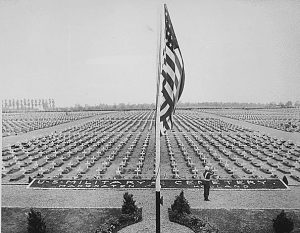 collected flowers from 60 different Dutch villages. Nearly 200 Dutch men, women and children spent all night arranging flowers and wreaths by the dirt-covered graves, which bore makeshift wooden crosses and Stars of David. By 8am, the road leading into Margraten was jammed with Dutch people coming on foot, bicycle, carriages, horseback and by car. Silent film footage shot that day shows some of the men wearing top hats as they carried wreaths. A nun and two young girls laid flowers at a grave, then prayed. Solemn-faced children watched as cannons blasted salutes. The Dutch, Shomon wrote, “were perceptibly stirred, wept in bowed reverence.” All they do for these heroes is because they have vowed never to forget.
collected flowers from 60 different Dutch villages. Nearly 200 Dutch men, women and children spent all night arranging flowers and wreaths by the dirt-covered graves, which bore makeshift wooden crosses and Stars of David. By 8am, the road leading into Margraten was jammed with Dutch people coming on foot, bicycle, carriages, horseback and by car. Silent film footage shot that day shows some of the men wearing top hats as they carried wreaths. A nun and two young girls laid flowers at a grave, then prayed. Solemn-faced children watched as cannons blasted salutes. The Dutch, Shomon wrote, “were perceptibly stirred, wept in bowed reverence.” All they do for these heroes is because they have vowed never to forget.
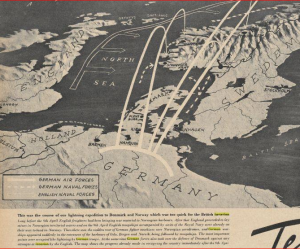 During World War II, it seems that there were a number of missed warnings about coming actions. Perhaps, if these warnings had been heeded, parts of the war, and indeed the length of it might have been different. One such event occurred when two German officers who were flying after consuming too much alcohol, became lost in the inky black night sky, when suddenly their plane began to nosedive. Maybe they thought, as their doomed plane plunged toward the ground, “Please let this be German soil we’re hurtling towards.” No matter what their thoughts were, they were definitely not headed for a crash landing in Germany, but rather they crashed in Holland.
During World War II, it seems that there were a number of missed warnings about coming actions. Perhaps, if these warnings had been heeded, parts of the war, and indeed the length of it might have been different. One such event occurred when two German officers who were flying after consuming too much alcohol, became lost in the inky black night sky, when suddenly their plane began to nosedive. Maybe they thought, as their doomed plane plunged toward the ground, “Please let this be German soil we’re hurtling towards.” No matter what their thoughts were, they were definitely not headed for a crash landing in Germany, but rather they crashed in Holland.
The crash landing in Holland was a big problem for the officers, because they were carrying battle plans for Hitler’s coming invasion of Holland. The plans, which involved exotic strategies like flamethrowers, and using gliders to silently deliver troops behind enemy lines, all seemed so unlikely that the 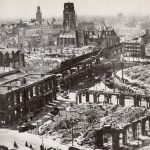 Dutch commanders refused to believe it. Just weeks later, it all unfolded exactly as the plan had foretold. Germany occupied Holland. It seems incredible but almost every daring German offensive was known well beforehand. Yet, in every case, those in power refused to see what was right in front of them. Hitler could have been stopped long before he was, if these botched early warnings had been taken seriously. In another such example, a German deserter was captured by the Russians. He gave up the plans to Hitler’s “Operation Barbarossa.” Yet, the Russian commanders found the 1,800 mile wide offensive too unlikely to believe. Then, just weeks later, they were caught off guard by the largest invasion in history.
Dutch commanders refused to believe it. Just weeks later, it all unfolded exactly as the plan had foretold. Germany occupied Holland. It seems incredible but almost every daring German offensive was known well beforehand. Yet, in every case, those in power refused to see what was right in front of them. Hitler could have been stopped long before he was, if these botched early warnings had been taken seriously. In another such example, a German deserter was captured by the Russians. He gave up the plans to Hitler’s “Operation Barbarossa.” Yet, the Russian commanders found the 1,800 mile wide offensive too unlikely to believe. Then, just weeks later, they were caught off guard by the largest invasion in history.
But, perhaps the most chilling warning of all came far earlier: before the war had even started. The warning came from an analyst dispatched to Hitler’s Germany in 1938. In 1939 he delivered a sobering prediction: the worst conflict in history was about to begin. He reported: “War is coming to Europe, but not until September at the earliest.” On September 1, 1939, Hitler launched his attack on Poland. World 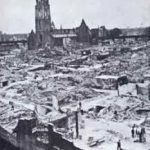 War II had begun. That analyst belonged to a group that soon became part of the largest underground news and research network in the world. One that would go on to predict large world shifts with shocking accuracy: As early as 1987, this network predicted the fall of the Soviet Union. In 1989, they called the crash of the Japanese “miracle.” In the early 90s, they spoke out about the threat of radical Islamic terrorism. In the mid 2000s, they predicted the 2008 financial meltdown. They also predicted Donald Trump’s improbable win in the 2016 Presidential race, which in my opinion was their best prediction. Sadly, this underground news and research group, was not taken seriously in the warnings they gave, and the world paid the consequences for those missed warnings.
War II had begun. That analyst belonged to a group that soon became part of the largest underground news and research network in the world. One that would go on to predict large world shifts with shocking accuracy: As early as 1987, this network predicted the fall of the Soviet Union. In 1989, they called the crash of the Japanese “miracle.” In the early 90s, they spoke out about the threat of radical Islamic terrorism. In the mid 2000s, they predicted the 2008 financial meltdown. They also predicted Donald Trump’s improbable win in the 2016 Presidential race, which in my opinion was their best prediction. Sadly, this underground news and research group, was not taken seriously in the warnings they gave, and the world paid the consequences for those missed warnings.
 Top secret military bases are common, and have been around longer than most of us would think, but few of them would have been like RAF Rudloe Manor. Most top secret bases had very restricted access, but RAF Rudloe Manor had a way of becoming almost invisible. I’m no expert on top secret bases, and I’m sure that several are underground, but this one struck me as being the best way to hide a military base…ever!! RAF Rudloe Manor is located south-east of Bath. It is just one of several sensitive military installations situated on the Spring Quarries, Copernacre Quarry, the villages of Hawthorn and Hudswell, and the town of Corsham. In World War II the Ministry of Aircraft Production built the Beaverbrook underground aircraft factory here for Bristol Aeroplane and other companies.
Top secret military bases are common, and have been around longer than most of us would think, but few of them would have been like RAF Rudloe Manor. Most top secret bases had very restricted access, but RAF Rudloe Manor had a way of becoming almost invisible. I’m no expert on top secret bases, and I’m sure that several are underground, but this one struck me as being the best way to hide a military base…ever!! RAF Rudloe Manor is located south-east of Bath. It is just one of several sensitive military installations situated on the Spring Quarries, Copernacre Quarry, the villages of Hawthorn and Hudswell, and the town of Corsham. In World War II the Ministry of Aircraft Production built the Beaverbrook underground aircraft factory here for Bristol Aeroplane and other companies.
The area is home to vast caverns, encompassing some 2,250,000 square feet of space, divided into many smaller chambers. Other quarries in the area were expanded and linked together, thereby forming a huge network of tunnels and bunkers. Some parts these tunnels and bunkers were used for army storage purposes. 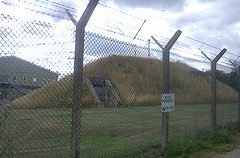 An RAF Fighter group HQ (RAF Box), and a communications switching center were also set up, making the area an important military nerve center even then. The area also housed the so-called Corsham Computer Centre which while based in Wiltshire, has been alleged to house access to a secret underground city below this English county. Many attempts have been made to gain access to, or at the very least, to confirm of the nature of, this innocent looking facility. Finally, in September of 2000, Sky News was given unprecedented access to this underground city below Wiltshire. The access didn’t specifically mention the Computer Centre as point of entry, however, the news report identified Corsham as the location. As they entered, their camera crews were invited to descend 120 feet below the surface into the previously secret underground city. They saw 60 miles of tunnels, including underground railway stations. Pictures were taken of a recently decommissioned nuclear command bunker. Interestingly, a canteen, which operated in the Second World War, still had murals painted by manufacturing engineers working on the Wellington Bomber engines.
An RAF Fighter group HQ (RAF Box), and a communications switching center were also set up, making the area an important military nerve center even then. The area also housed the so-called Corsham Computer Centre which while based in Wiltshire, has been alleged to house access to a secret underground city below this English county. Many attempts have been made to gain access to, or at the very least, to confirm of the nature of, this innocent looking facility. Finally, in September of 2000, Sky News was given unprecedented access to this underground city below Wiltshire. The access didn’t specifically mention the Computer Centre as point of entry, however, the news report identified Corsham as the location. As they entered, their camera crews were invited to descend 120 feet below the surface into the previously secret underground city. They saw 60 miles of tunnels, including underground railway stations. Pictures were taken of a recently decommissioned nuclear command bunker. Interestingly, a canteen, which operated in the Second World War, still had murals painted by manufacturing engineers working on the Wellington Bomber engines.
They were told that some 4000 personnel were engaged in this secret work at that time. Sky News also transmitted 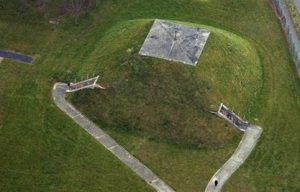 pictures of massive underground ventilation fans the size of modern jet engines. Why the Government has chosen this moment to disclose this information is anyone’s guess, but the report seemed like a complete U-turn by the military establishment in Wiltshire. Prior to this time, they had remained silent about the claims of underground facilities in this area. As if the act of not talking about it would make the suspicions go away. Still, the very fact that a work-force of 4000 people was able to keep this facility secret for 60 years goes to show how easy it is for Governments to hide their secrets away. And the base looks like just another country manor to this very day.
pictures of massive underground ventilation fans the size of modern jet engines. Why the Government has chosen this moment to disclose this information is anyone’s guess, but the report seemed like a complete U-turn by the military establishment in Wiltshire. Prior to this time, they had remained silent about the claims of underground facilities in this area. As if the act of not talking about it would make the suspicions go away. Still, the very fact that a work-force of 4000 people was able to keep this facility secret for 60 years goes to show how easy it is for Governments to hide their secrets away. And the base looks like just another country manor to this very day.

 When my husband, Bob and I went to Alaska a few years ago, I was hoping against hope that we would be able to see the Aurora Borealis. The likelihood was slim, of course, because they are most often visible in the winter and we were there in the summer. The Aurora Borealis is caused by solar flares, which occur when pent up magnetic energy on the sun’s surface is unleashed in blasts of radiation and charged particles. The resulting explosions are equivalent to the force of millions of hydrogen bombs, and the solar winds they create have the ability to wreak havoc on Earth’s atmosphere. That was precisely what happened in late August and early September of 1859, when the planet was bombarded by the largest solar storm on record. The so-called “Carrington Event” was named for the British astronomer, Richard Carrington, and it made the skies glow with shimmering, multi-colored auroras as far south as Hawaii. In Colorado, it was so bright that one witness reported people “could easily read common print” at night. And that was in August and September!! Why couldn’t I have been around to see that one?
When my husband, Bob and I went to Alaska a few years ago, I was hoping against hope that we would be able to see the Aurora Borealis. The likelihood was slim, of course, because they are most often visible in the winter and we were there in the summer. The Aurora Borealis is caused by solar flares, which occur when pent up magnetic energy on the sun’s surface is unleashed in blasts of radiation and charged particles. The resulting explosions are equivalent to the force of millions of hydrogen bombs, and the solar winds they create have the ability to wreak havoc on Earth’s atmosphere. That was precisely what happened in late August and early September of 1859, when the planet was bombarded by the largest solar storm on record. The so-called “Carrington Event” was named for the British astronomer, Richard Carrington, and it made the skies glow with shimmering, multi-colored auroras as far south as Hawaii. In Colorado, it was so bright that one witness reported people “could easily read common print” at night. And that was in August and September!! Why couldn’t I have been around to see that one?
Most of us have seen pictures of the Northern Lights, also known as the Aurora Borealis. The scene is unforgettable offering an entrancing, dramatic, magical display of dancing lights that are varying in color and fascinate all who see it. It’s hard to believe that an explosion on the sun that sends out radioactive magnetic particles into the atmosphere is responsible for this dazzling natural phenomenon. Of course it is quite complicated. If all those particles were able to just hit the Earth, the event would be disastrous. “The aurora is caused by the interaction of high-energy particles (usually electrons) with neutral atoms in earth’s upper atmosphere. This process is similar to the discharge in a neon lamp, or the fluorescence of a television screen. The strongest auroras are quite bright, comparable to moonlight. At the center of the sun, the temperature is 27 million degrees Fahrenheit (15 million degrees Celsius). As the temperature on its surface rises and falls, 
 the sun boils and bubbles. Particles escape from the star from the sunspot regions on the surface, hurtling particles of plasma, known as solar wind, into space. It takes these winds around 40 hours to reach Earth. When they do, they can cause the dramatic displays known as the aurora borealis.” However it all happens, is pretty much irrelevant to most of us, we just like the beauty of the Aurora Borealis, and we will continue to be mesmerized by them.
the sun boils and bubbles. Particles escape from the star from the sunspot regions on the surface, hurtling particles of plasma, known as solar wind, into space. It takes these winds around 40 hours to reach Earth. When they do, they can cause the dramatic displays known as the aurora borealis.” However it all happens, is pretty much irrelevant to most of us, we just like the beauty of the Aurora Borealis, and we will continue to be mesmerized by them.

 For most of this last year, my niece Lindsay Moore’s life has been a whirlwind of excitement and activity. With the birth of her little girl, Mackenzie Rose, Lindsay and her husband, Shannon have been enjoying every new experience that comes with parenthood. Mackenzie is a happy, and sometimes goofy girl, who keeps them on their toes. Mackenzie is starting to walk these days, and getting into anything within reach, so her parents have to keep a close eye on her now. Lindsay has been a work-from-home wife for some time, employed remotely by South Dakota State University, and now she is also a stay-at-home mom to little Mackenzie. For Lindsay, life doesn’t get any better. she is just living the dream that she has had for a long time. Lindsay is a health and exercise advocate and always keeps herself in excellent shape. Of course, these days that exercise is easier, because Mackenzie keeps her mommy running.
For most of this last year, my niece Lindsay Moore’s life has been a whirlwind of excitement and activity. With the birth of her little girl, Mackenzie Rose, Lindsay and her husband, Shannon have been enjoying every new experience that comes with parenthood. Mackenzie is a happy, and sometimes goofy girl, who keeps them on their toes. Mackenzie is starting to walk these days, and getting into anything within reach, so her parents have to keep a close eye on her now. Lindsay has been a work-from-home wife for some time, employed remotely by South Dakota State University, and now she is also a stay-at-home mom to little Mackenzie. For Lindsay, life doesn’t get any better. she is just living the dream that she has had for a long time. Lindsay is a health and exercise advocate and always keeps herself in excellent shape. Of course, these days that exercise is easier, because Mackenzie keeps her mommy running.
Lindsay’s husband is the tight ends coach at Eastern Carolina University, and so during the football season, Lindsay and Mackenzie spend Saturdays at the games cheering on Daddy’s team, and hanging out with friends at the game. Lindsay has always been a football fan, especially if it’s Shannon’s team playing. When Shannon married Lindsay, he married his biggest fan, and now they have added another member to the fan club. If you ask me, Shannon has the cutest cheerleaders ever. Lindsay is a very social person, so they are always joined by friends at the games, while they are cheering the team on. It’s a good thing that she makes friends so easily,since they have moved around every so often. It is a common thing with coaching.
Lindsay and Shannon were in Wyoming visiting family this summer, which is a fairly common occurrence for 
 them. His job and her work-from-home job make it easier for them to come home in the summertime, so the family gets to see them more than the average kids who live far away. They family went to the Black Hills, where we joined them for the 4th of July festivities in Custer, South Dakota. Then they went on to the Big Horns. It’s a blessing for my sister, Allyn Hadlock and her husband, Chris, and the rest of the family. It’s hard to have a grandchild who lives far away, and having them visit often makes it a little bit easier. Today is Lindsay’s birthday. Happy birthday Lindsay!! Have a great day!! We love you!!
them. His job and her work-from-home job make it easier for them to come home in the summertime, so the family gets to see them more than the average kids who live far away. They family went to the Black Hills, where we joined them for the 4th of July festivities in Custer, South Dakota. Then they went on to the Big Horns. It’s a blessing for my sister, Allyn Hadlock and her husband, Chris, and the rest of the family. It’s hard to have a grandchild who lives far away, and having them visit often makes it a little bit easier. Today is Lindsay’s birthday. Happy birthday Lindsay!! Have a great day!! We love you!!
 My grand-niece, Aurora Hadlock is growing up so fast. She is a girl of many talents. Of course, having a big brother, Ethan, who loves his sister and hangs out with with her, helps Aurora to diversify in her choices of activities. Ethan has taught her to play Minecraft,and they play together. Also,having a big brother who likes football has made Aurora like the game too. So it seemed only logical for her to decide to sign up for Flag Football. I know that she will have a great time with that. She is athletic,and while she has a girly side, there is a little of a tomboy in her too.
My grand-niece, Aurora Hadlock is growing up so fast. She is a girl of many talents. Of course, having a big brother, Ethan, who loves his sister and hangs out with with her, helps Aurora to diversify in her choices of activities. Ethan has taught her to play Minecraft,and they play together. Also,having a big brother who likes football has made Aurora like the game too. So it seemed only logical for her to decide to sign up for Flag Football. I know that she will have a great time with that. She is athletic,and while she has a girly side, there is a little of a tomboy in her too.
Aurora still loves to read and has since the day she learned how. Reading has always been a big part of her life. Her parents and grandparents read to her, as did her big brother. Books have long been a highlight of Aurora’s life. She also likes art…a trait that she gets from her mother, who is very crafty. They love to make beautiful things for their home, and as in her mother’s case, selling them. I don’t think it will be very long before Aurora’s mom can include some of her artwork for sale too.
Something I was not aware of is that Aurora is actually a chip off the old block…or as in her case, two blocks…her dad, Ryan Hadlock and her grandpa, Chris Hadlock. Both of the men play the guitar, and now I have learned that Aurora plays too. She is learning from them, and loves to have jam sessions as a threesome. Really, that is pretty impressive for a 7 year old girl. Of course, when you look back in her genealogical line, she comes from a long line of guitar players, that include her great grandpa, Allen Lewis Spencer, and 2nd great grandpa, Allen Luther Spencer. With all that talent (and maybe more for all I know) in her lineage, it’s no wonder that Aurora is a guitar player at the tender age of 7 years. I think it is sad that her other grandpa’s didn’t get a chance to jam with her too, but maybe they can in Heaven when we all get there.
maybe they can in Heaven when we all get there.
Aurora is such a sweet little girl who is always smiling. She is getting ready to start 2nd grade this year, and I know she will do very well, because she is a good student who loves to learn new things. She has enjoyed her summer, and has done some great things, including a family vacation to Disneyland, where she met lots of Disney characters, and especially loved the rides…if I know her. But then, the princesses and mermaids were probably highlights too. Aurora has had a great year, and I know the coming year will be even better. Today is Aurora’s 7th birthday. Happy birthday Aurora!! Have a great day!! We love you!!
 My nephew, Josh Griffith is a hard working man, who loves his family, and would do anything for them. He is constantly doing things to improve their home,and he is always able to fix the things that break. Their house is all electric, but they are planning to change it to a gas furnace this year. For now, the family needs 4 trailer loads of wood a year to heat the home without using the electric heat. Josh spend a lot of his free time chopping and splitting the wood so that the family can stay warm all winter. My niece and his wife, Susan helps too, but chopping wood is a tough job for most women, and so Josh does most of it by himself. Josh also spends a good deal of his time keeping the family from being snowed in. He plows snow almost constantly…and does it all without complaint…because he is the provider, and it’s for his family.
My nephew, Josh Griffith is a hard working man, who loves his family, and would do anything for them. He is constantly doing things to improve their home,and he is always able to fix the things that break. Their house is all electric, but they are planning to change it to a gas furnace this year. For now, the family needs 4 trailer loads of wood a year to heat the home without using the electric heat. Josh spend a lot of his free time chopping and splitting the wood so that the family can stay warm all winter. My niece and his wife, Susan helps too, but chopping wood is a tough job for most women, and so Josh does most of it by himself. Josh also spends a good deal of his time keeping the family from being snowed in. He plows snow almost constantly…and does it all without complaint…because he is the provider, and it’s for his family.
Josh has spent a lot of time teaching his girls to ride horses. Susan didn’t grow up around horses, and so she 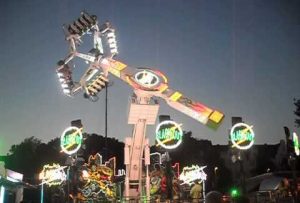 wasn’t too sure about riding horses.Josh worked with her, and before long, Susan has a good time with it. Their daughters, Jala and Kaytlyn have grown up around horses, and so they will be naturals at it. Josh and Jala go riding quite a bit and have even hunted together. Susan says that Josh is definitely the more hands on parent. I suppose that is because Susan has always had such a soft heart. She parents in a different way. Nevertheless, Josh taught Jala to drive more than Susan did because she said, “I was so scared.” It can be scary to teach a child to drive. It seems that usually one of the other parent has the right temperament for it, and the other doesn’t. Clearly, Josh will be the driving instructor for their girls.
wasn’t too sure about riding horses.Josh worked with her, and before long, Susan has a good time with it. Their daughters, Jala and Kaytlyn have grown up around horses, and so they will be naturals at it. Josh and Jala go riding quite a bit and have even hunted together. Susan says that Josh is definitely the more hands on parent. I suppose that is because Susan has always had such a soft heart. She parents in a different way. Nevertheless, Josh taught Jala to drive more than Susan did because she said, “I was so scared.” It can be scary to teach a child to drive. It seems that usually one of the other parent has the right temperament for it, and the other doesn’t. Clearly, Josh will be the driving instructor for their girls.
Josh does work very hard, but work is not the only thing we do for our families. There is the all important 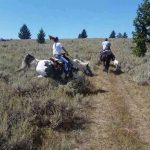 quality time as a family too. This year, Josh and Susan took the girls to the Billings Fair, in Billings Montana. Living in a small town like Powell, the girls don’t usually have a chance to ride on some of the cool rides that they have in bigger cities. This year, the big deal was the Black Out. It is a totally crazy ride, that I would personally never ride. Susan said that all the rides at the Billings fair were so nice, and just seemed safer. Susan doesn’t have to worry about the girls being on the rides, because Josh always rides rides with the girls. Susan stands by holding everyone’s things…sounds like the place I would want to be too. Thankfully for Susan, Josh takes care of that for her…and she is so grateful for that and everything else Josh does for them. Today Is Josh’s birthday. Happy birthday Josh!! Have a great day!! We love you!!
quality time as a family too. This year, Josh and Susan took the girls to the Billings Fair, in Billings Montana. Living in a small town like Powell, the girls don’t usually have a chance to ride on some of the cool rides that they have in bigger cities. This year, the big deal was the Black Out. It is a totally crazy ride, that I would personally never ride. Susan said that all the rides at the Billings fair were so nice, and just seemed safer. Susan doesn’t have to worry about the girls being on the rides, because Josh always rides rides with the girls. Susan stands by holding everyone’s things…sounds like the place I would want to be too. Thankfully for Susan, Josh takes care of that for her…and she is so grateful for that and everything else Josh does for them. Today Is Josh’s birthday. Happy birthday Josh!! Have a great day!! We love you!!

